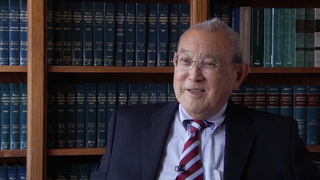Interviews
Not bringing shame to family
Of course we were raised in a Japanese American community, so that we were always cautioned about not bring shame onto the family, and whatever you do is going to reflect on the family kind of stuff. So we’d get admonitions of that sort.
I remember one time when one of the local nisei boys, I think he was a little bit older than me, ran away. And there was a orphanage in our community, and the orphanage sent their kids to the local school, so that they were our classmates. Apparently this one kid, he and some kids from the orphanage ran away one day. And I can’t remember what they were doing, [or] what they did, but it became a big gossip in the community about that.
And it’s used as a lesson about how not to bringing shame on your family. Now the community that I grew up in was, I would guess, about 50/50 Japanese Americans and Japanese and non-Japanese. In my specific class, three-quarters of us were nisei. We were the majority. But, we still had the sting of racism, you know, sort of ground into us.
Date: January 7, 2004
Location: California, US
Interviewer: Art Hansen
Contributed by: Watase Media Arts Center, Japanese American National Museum.
Explore More Videos

Postwar school-life
(b. 1930) Half Japanese and grew up in both Japan and the United States.

Fifty Years and Going Strong
(1938-2020) Japanese American attorney and civil rights activist

On Challenging Institutions
(1938-2020) Japanese American attorney and civil rights activist

Pop and Balls
(1938-2020) Japanese American attorney and civil rights activist

Re-examining Identity
(1941-2018) Japanese Canadian photojournalist and activist

Being Denied as a Japanese American Lawyer
(b. 1934) The First Japanese American Appointed to the U.S. Court of Appeals.



Conflicted about immigrating to America (Japanese)
(b. 1925) War bride



Defining "Nikkei"
(1941-2018) Japanese Canadian photojournalist and activist

Discrimination faced in San Francisco (Japanese)
(b. 1937) A war bride from Yokohama

The difference between Nikkei community in Oizumi and Brazil (Japanese)
(b. 1979) Sansei Nikkei Brazilian who lives in Oizumi-machi in Gunma prefecture. He runs his own design studio.

Accepted by Japanese society as I learned more Japanese (Japanese)
(b. 1979) Sansei Nikkei Brazilian who lives in Oizumi-machi in Gunma prefecture. He runs his own design studio.
